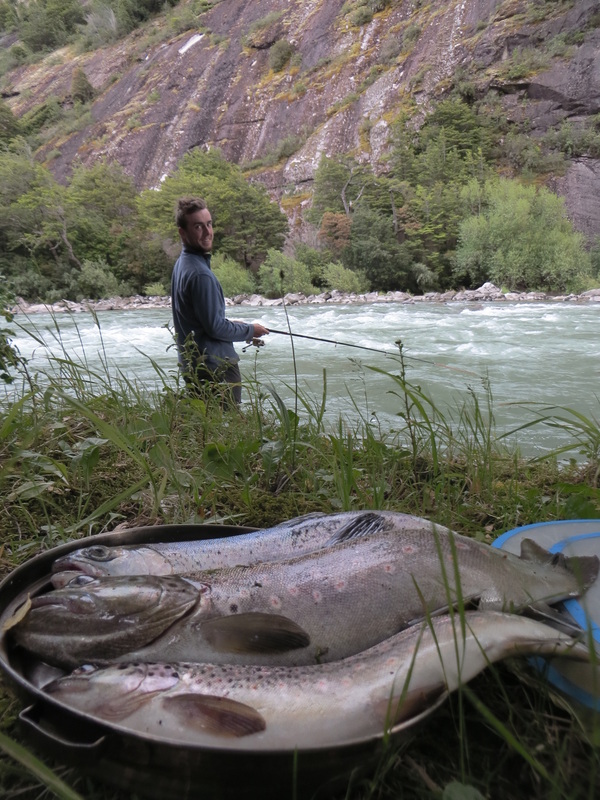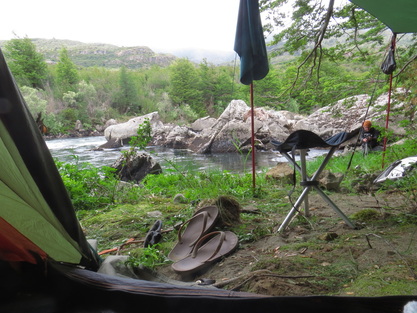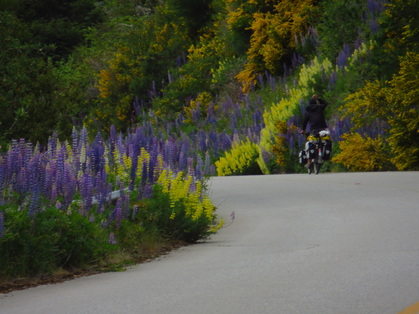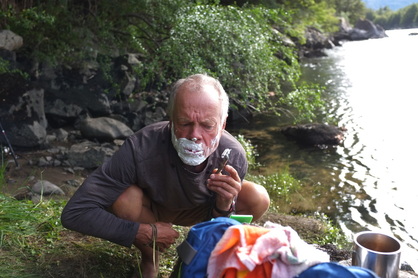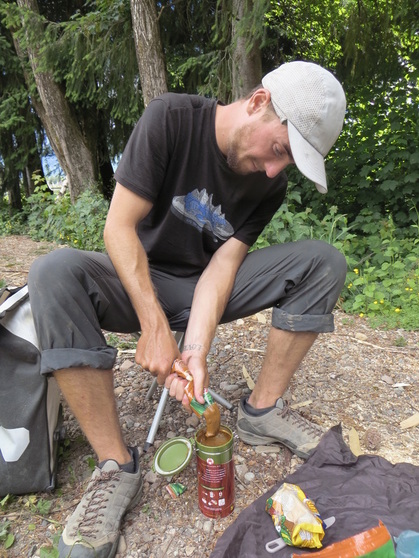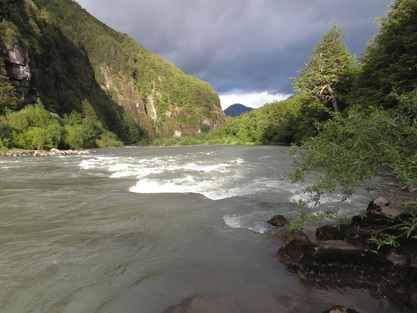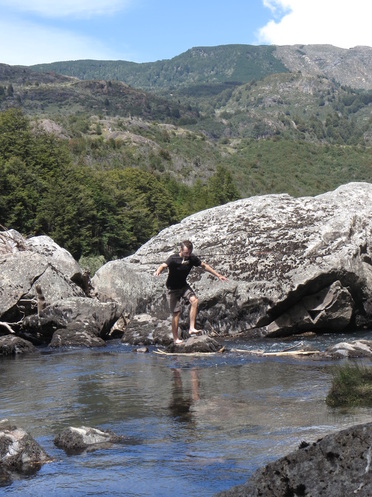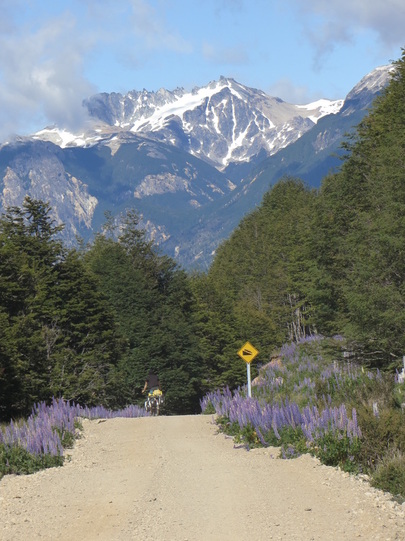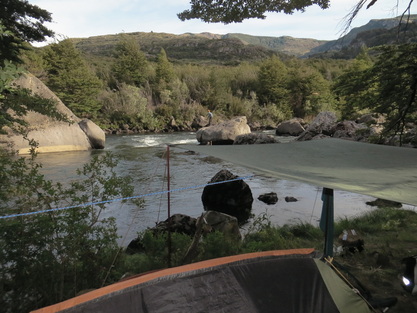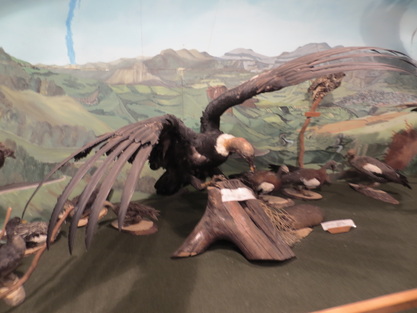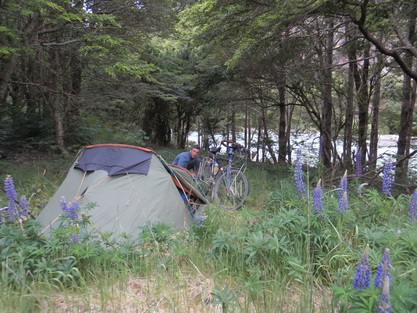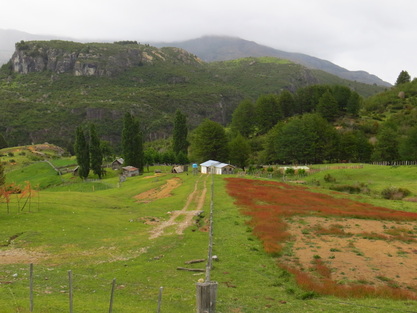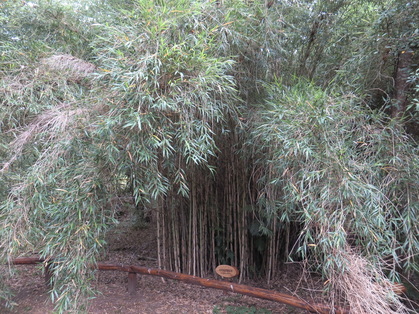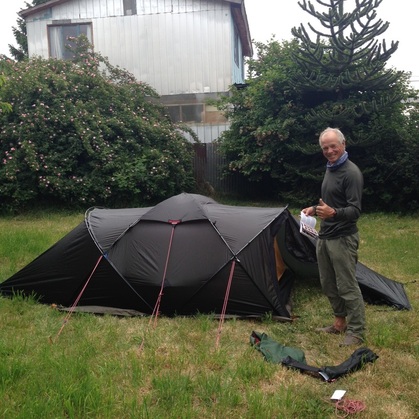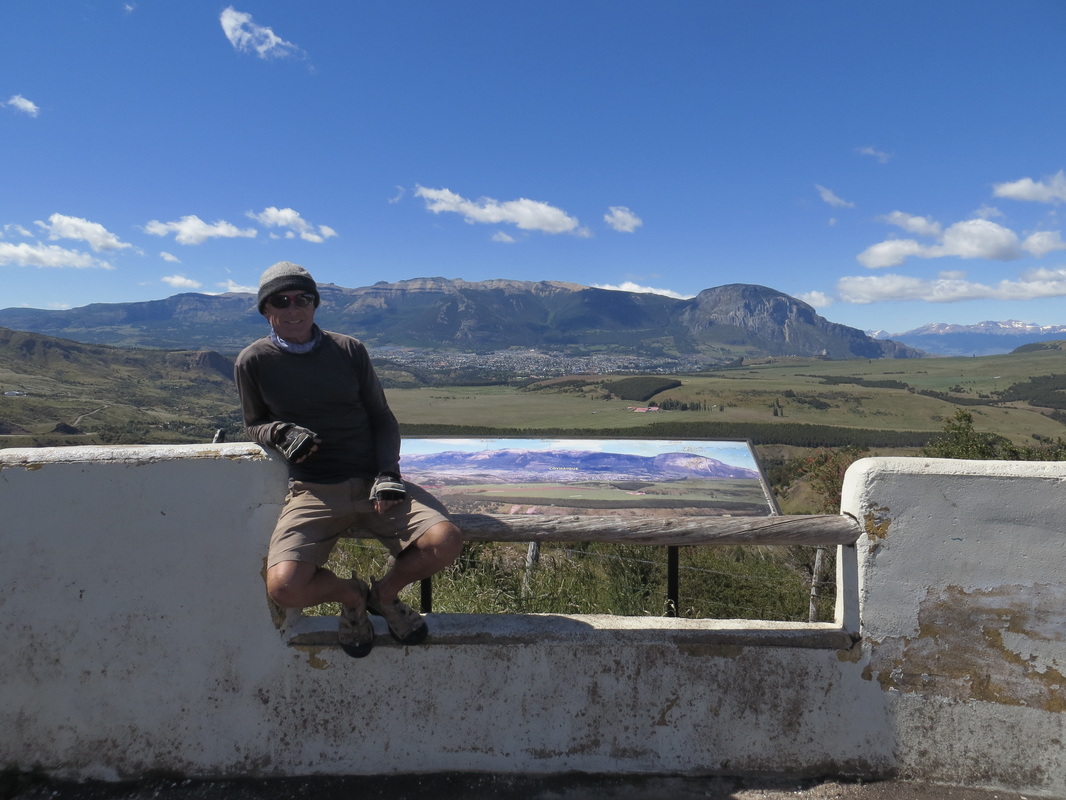To View progress, "type overnight stop map" in search box
This maybe the last entry before Christmas, so to everyone, friends and family, having a browse, we wish you a very special day.
For us, if we don't make it to a hostal, it will be spent alongside a river somewhere here in Patagonia, things could be a lot worse!!
This maybe the last entry before Christmas, so to everyone, friends and family, having a browse, we wish you a very special day.
For us, if we don't make it to a hostal, it will be spent alongside a river somewhere here in Patagonia, things could be a lot worse!!
Life on the River Santiago Bastia for a couple of days can be seen here.
16/12/2013 Rio Santiago Bastia to a bush camp in Reserva Nacional Rio Simpson
D75, T4.5/7, Av15, Max55, Tot 23,283/ 13,486
Warm slight cloud cover, mixed winds
Our time at the riverside camp below the road on the Rio Santiago Bastia, was a great time. Cal and I had special time together, not riding just chilling out and chatting about all sorts of things in the most idyllic of situations.
The second day we fished, slept, washed clothes, shaved, read our books, and ate like kings.
We also noted that the river had risen some 3 or 4 inches on a rock mid stream.
We caught so many trout in this river we could not even count them .At least a dozen fish were caught in the hole in front of our camp.
Most were released however many found their way into our fry pan. This kind of fishing is what it must have been like in the old days so to speak.
We were enjoying seeing who could pick the spot of water that might hold a fish. Some were caught in patches of water the size of a bath tub between two partly submerged rocks.
It appears the law here regarding fish, is you are not allowed more than 3 fish greater than 35cm each day per person, there is no lower size limit. A great idea. The pan size fish are the best eating.
We probably stretched the number allowed each day, considering we would eat 3 to 4 fish for each meal of the day.
Our excuse we were eating to survive “not quite but close!!”.
Our spinners are not realistic enough to induce large trout to bite. Fly fishing on this river would undoubtedly produce some large fish, though casting in most places would be very difficult.
This river is popular with French and Spanish fishers, none were seen during our stay.
This morning we packed up and man handled our gear back to the road. It had been the ideal way to fill in a couple days.
The ride out on the gravel raod was just as treacherous on the way in, very steep and loose gravel.
A couple of farmers were met and a band of nomad type people passed us with pack horses and what looked like all their belongings they did not say anything other than return greetings.
We followed a mob of cattle for sometime on the road. Most had diarrhea, much of which adhered to our wheels as it was unloaded in unavoidable spots on the narrow road.
Many calves had just been seperated from their mums, does stress cause diarrhea? Possibly, or was it just the sweet grass here in the valley.
Milk is not sold on the farm, it produces meat only.
Once back in Mañihuales we bought more biscuis and Dulce.
We are flying through the dulce using it liberally on biscuits and bread. It is so damn nice.
Jorge was on his way to work in Aisén, he pulled over for a chat on the roadside.
It was nice to be back on asphalt. The ride south was a pleasure following a river valley with the Simpson river with us for the last part of the day.
We had lunch by a creek at Villa Los Torreones, Dulce on bread of course and mate, Cal had a coffee.
Coming to The Simpson River reserve we pulled in. It was great they had all the local trees named, importantly their botanical names.
I took photos of the signs, and the trees leaves and bark. Great for future reference.
From here we started looking for a camp.
We were both really trashed by lunch time having ridden 60km with only breakfast.
We found a great camp on the Simpson in the bush.
By the time my tent was set up Cal had caught 3 good fish, two varieties of trout.
This trip is becoming a bit of a fishing expedition, we can’t help ourselves. Finding a camp site on a river is no problems.
Really, after Coyhaique, we have to put in a few big days, possibly!
We both enjoy cooking and savour fish, especially when it is so fresh. Having this interest nearly always sees us camping in riparian locales.
It is always challenging to see if we can find a good fishing spot infront of a camp. So far so good. Since arriving on Chiloé and here on the mainland, not too many days have passed without us enjoying trout or salmon.
The little telescopic rod has certainly earnt its passage south. Callum brought my little threadline reel from home.
The fish were filleted, fried and seasoned. They are always so fresh we have to cut the skin as it shrinks, to stop them curling into sausages in the pan.
Cal cooked rice, tuna and onions laced with curry.
All this was followed by hot chocolate.
Camping in this part of Patagonia is bliss, there are almost no insects except the Horse flies that land on you and bite. These are easy to kill.
Remarkebly there are no mossys that bite. There is little dew in the morning and the nights are mild, about 7 or 8 degree lows.
Perfect sleeping temperatures.
We are both hoping we are held up no longer and the tent arrives as said on Tuesday or Wednesday.
I need to get my rear rack welded as it has a crack in one of the tubes.
Our camp on the Simpson will see us get into Coyhaique at a reasonable hour tomorrow. Sven and Sabina emailed us about a good hostal, we will try it.
We were in bed early tonight, both very worn out, though not hungry, putting full stomachs and tired legs to rest
17/12/2013 Simpson river to Coyhaique
D34, T2.5, Av14, Max59, Tot 23,317, 13,520
Wet morning, improved to a hot day
We both woke up during the night to the sound of rain.
In the morning things were rather wet. We managed to get in breakfast between showers.
Two very wet tent were packed. Once back on the road we negotiated it with caution. It is a concrete carriageway with no shoulder and is largely occupied by fast moving traffic
It took us alongside the Simpson for much of the way.
Soon we started to climb and were taken through a tunnel, once at the top we rested a bit and ate bread. Then began a descent. Still on concrete.
Some way down a lookout offered a great view of the city, sitting on a huge terrace at the foot of a range.
All this with a northerly aspect. Great location.
From here we let the bikes go, it was a great descent until doing about 60km/hr ahead of Cal the concrete abruptly ended, my brakes were applied as heavily as could be. Still flying along, I was launched off the concrete into gravel.
Still doing 30 odd km , applying maximum concentration, the time for further heavy braking was over, it was all I could do to stay upright.
The absence of large stones saved the day, Cal saw the obstacle and was prepared.
To other cyclists, watch out for this break in the pavement, though short it is dangerous.
Dorothee emailed and said she had come off further south and was resting a sore shoulder. She is ok but we will be watching the temptation to gather speed on gravel
Especially on the gravel road descents. Changing channels at speed is so precarious, you really cant use your brakes in these situations or if you do, use them everso lightly and hang on.
There was a climb up to the location of the city.
Once in there some guys told me where to get the rack repaired.
We found a great hostal on Calle Simpson. The hostal that Sven and Sabina used had no wifi.
Our tents and other gear were hung up to dry while we feasted on cherries from a tree in the back yard.
The owners of the yellow bike shop hereon Simpson directed me to a place to get the rack welded.
The man that did it was in his 70’s, he knew what he was doing when working with the thin titanium tubing on the Tubus rack, using oxy.
The workshop is just down from the corner of Simpson and Libertad. We had a good chat with the guys in the workshop. A great job had been done.
From here we found a cafe and had burgers and chips. A good grease up, but who cares.
Things are getting incredibly expensive as we move south. especially all kinds of food items and fruit.
The tent had not arrived, the waiting game begins.
This town really is the last descent size place to Puerto Natales, at least another few weeks south.
Other cyclists have told me of problems catching boats across the lakes.
It appears that as the summer progresses these boats become more reliable and regular with their services. Some of the others were south quite early in the season.
Here we will stock up on porridge, coffee, Bencina, carnita, milk powder, soups, tuna and dulce de Leche in bulk.
The way Callum is riding his bike up some of the steep hills, he can do with some extra weight!
The cherry tree in the back yard is attracting us to its fruit like moths to light.
We cant stop eating the little delights. I have been climbing it to access its fruits.
Just thinking, whilst perched on a branch within the canopy. How ironical it would be should an injury occur from falling out of a tree after so many kilometres on the road.
With this in mind I hung on a little tighter and decided not to climb higher. Those fruit higher in the tree were like "The forbidden fruit".
The hostal is hospedaje is called Normi on Calle Simpson 18.
From the BBC
Great news for the children of Chile coming from families with not o much
Winning Chile's presidential election was pretty easy for Michelle Bachelet.
She led the contest from the start and never faced much of a challenge from her bickering centre-right opponents.
The hard part will start in March when she takes office.
Ms Bachelet will inherit a country with an economy that grew by 5.6% last year. Unemployment is low and inflation is under control.
But things are likely to get worse. The growth rate is expected to ease to 4.2% this year and the central bank warns it might drop below 4% in 2014.
The price of copper, Chile's main export commodity, is seen extending its recent decline and the bank expects the country's trade surplus to shrink to $600m (£368m) in 2014 from $2.5bn in 2013.
Copper is Chile's main export commodity, but its price has been falling None of this is good news for an incoming president who is promising sweeping and expensive social reforms.
Education first Ms Bachelet has placed education at the top of her priorities.
Students in Chile have been demanding free public education At the moment, Chile's schools and universities rely heavily on household funding to supplement the meagre contributions they get from the state.
She wants to change that, turning the entire apparatus into a state-funded system within six years.
By the end of her four-year term she has promised that the state will pay the tuition fees of the poorest 70% of Chile's higher education students.
"Her proposals reset the clock for the education system, and she'll probably have the support in parliament she needs to get them passed," says Kirsten Sehnbruch, professor of public policy at the University of Chile.
"But the big problem with this strategy, aside from it being a significant investment, is that is doesn't address the issue of quality."
Costly promises Even Ms Bachelet's closest aides acknowledge her education reforms will be costly, eating up an extra 1.5% to 2% of gross domestic product each year.
She says that money will come from taxes, particularly on big business.
Ms Bachelet plans to raise Chile's basic corporate tax rate from 20% to 25% over four years and to abolish a mechanism that allows companies to defer indefinitely the payment of tax on their re-invested profits.
"I expect the tax reform to be approved within the first year because it only requires a simple majority in parliament," says Claudio Fuentes, a political scientist at the Diego Portales University in Santiago.
"That will pave the way for education reform between 2015 and 2018. Some of the changes she wants to make in education require a fourth-sevenths majority in parliament while others require a three-fifths majority. So, on certain issues she's going to have to negotiate with the right."
New constitution The other big pledge of Ms Bachelet's campaign is constitutional change.
Ms Bachelet promised to reform the Pinochet-era constitution if she was elected She says Chile needs a new constitution to replace the one drawn up under Gen Augusto Pinochet in 1980, as well as a new electoral system.
The current one ensures that the two big coalitions get almost all the seats in Congress, split fairly evenly between them. Small parties and independent candidates do not get much of a look-in.
"There's a consensus on the fact that the electoral system needs to go," Ms Sehnbruch says.
"The question is: what do you replace it with? Constitutional reform is more complex and will need more negotiation."
Deep inequality Many Chileans want Ms Bachelet to address the country's deep economic inequalities.
Of the 34 countries of the Organisation for Economic Cooperation and Development (OECD), Chile has the biggest gap between rich and poor.
Activists have been demanding a change to Chile's strict abortion laws She will also come under pressure from some quarters on ethical issues such as abortion and gay marriage.
At present, Chile has some of the strictest abortion laws in the world. The practice is illegal in all circumstances, even in cases of rape or when the mother's life is in danger.
Ms Bachelet, a paediatrician by training, wants to change that and has also come out in favour of gay marriage, although the majority of Chileans oppose it.
"I imagine that therapeutic abortion will be legalised but gay marriage at this stage is unlikely to be passed," Ms Sehnbruch says.
Ms Bachelet will have to work hard to keep her broad centre-left coalition united.
While Ms Bachelet has broad support, she will have to keep her coalition on board The last time she was in power, she governed at the head of a four-party bloc, the Concertacion, but his time around she has seven parties in her rebranded New Majority coalition.
"There are sure to be some problems," Mr Fuentes warns. "Managing seven parties is always going to be trickier than managing two or three."
That said, Ms Bachelet will at least enjoy a healthy parliamentary majority, something she lacked during her first term from 2006 to 2010.
Her coalition will have 68 seats in the 120-seat lower house and 21 of the 38 seats in the Senate.
This should allow her to push through basic legislation quickly and easily.
High hopes On foreign policy, Ms Bachelet will seek to improve ties with Chile's northern neighbours Peru and Bolivia, both of which have taken Chile to the International Court of Justice (ICJ) in The Hague over border disputes.
The ICJ is due to rule on Peru's claim in January, before Ms Bachelet takes office. The Bolivian verdict is not expected for some years.
But perhaps the biggest challenge facing Ms Bachelet is the weight of expectation.
After four years of centre-right rule, marked by huge street protests organised by students, workers and environmentalists, Chileans are clamouring for change.
"Expectations are very high, and not just among ordinary people but among the centre-left political elite," Ms Sehnbruch explains.
"The opportunity to make significant changes has now come and yet the presidential term is only four years long.
"To reconcile those two things - the massive agenda of what people want with the reality of what you can do in four years - is going to be very challenging."
18-19/2013 Coyhaique
Well the tent arrived, much to our relief, had it not got here we were going to ride to some lakes near the city.
Anyway, we spent some time practicing pitching it. Though it has 4 sets of poles it is remarkably quick to erect.
It is like a fortress and with almost vertical sides and 2 vestibules it is indeed a huge 2 man tent.
Hilleberg certainly do an unreal job making tents.
We were almost tempted to send Cals tent home with my old one and the tarp, there is almost room for all our gear inside.
Our cooking gear can now be left in one of the two end vestibules at night.
Inside the Tarra you could fit four people at a squeeze. I had a couple of footprints made up for each end, my old one suffices for the sleeping area.
The rest of the time was spent eating cherries and dining in town, we had a good steak with green veges last night.
The woman, Norma here keeps the place so warm with her wood fire stove, it is like a sauna upstairs.
Sadly, she has chronic bronchitis and is coughing terribly all the time.
She is a very like lady in her sixties I guess. We are the only guests here so it has been like our own house.
We are looking forward to moving on again, as always, there will be much to see.
It will be great to get into some cooler weather, it has been so hot here.
D75, T4.5/7, Av15, Max55, Tot 23,283/ 13,486
Warm slight cloud cover, mixed winds
Our time at the riverside camp below the road on the Rio Santiago Bastia, was a great time. Cal and I had special time together, not riding just chilling out and chatting about all sorts of things in the most idyllic of situations.
The second day we fished, slept, washed clothes, shaved, read our books, and ate like kings.
We also noted that the river had risen some 3 or 4 inches on a rock mid stream.
We caught so many trout in this river we could not even count them .At least a dozen fish were caught in the hole in front of our camp.
Most were released however many found their way into our fry pan. This kind of fishing is what it must have been like in the old days so to speak.
We were enjoying seeing who could pick the spot of water that might hold a fish. Some were caught in patches of water the size of a bath tub between two partly submerged rocks.
It appears the law here regarding fish, is you are not allowed more than 3 fish greater than 35cm each day per person, there is no lower size limit. A great idea. The pan size fish are the best eating.
We probably stretched the number allowed each day, considering we would eat 3 to 4 fish for each meal of the day.
Our excuse we were eating to survive “not quite but close!!”.
Our spinners are not realistic enough to induce large trout to bite. Fly fishing on this river would undoubtedly produce some large fish, though casting in most places would be very difficult.
This river is popular with French and Spanish fishers, none were seen during our stay.
This morning we packed up and man handled our gear back to the road. It had been the ideal way to fill in a couple days.
The ride out on the gravel raod was just as treacherous on the way in, very steep and loose gravel.
A couple of farmers were met and a band of nomad type people passed us with pack horses and what looked like all their belongings they did not say anything other than return greetings.
We followed a mob of cattle for sometime on the road. Most had diarrhea, much of which adhered to our wheels as it was unloaded in unavoidable spots on the narrow road.
Many calves had just been seperated from their mums, does stress cause diarrhea? Possibly, or was it just the sweet grass here in the valley.
Milk is not sold on the farm, it produces meat only.
Once back in Mañihuales we bought more biscuis and Dulce.
We are flying through the dulce using it liberally on biscuits and bread. It is so damn nice.
Jorge was on his way to work in Aisén, he pulled over for a chat on the roadside.
It was nice to be back on asphalt. The ride south was a pleasure following a river valley with the Simpson river with us for the last part of the day.
We had lunch by a creek at Villa Los Torreones, Dulce on bread of course and mate, Cal had a coffee.
Coming to The Simpson River reserve we pulled in. It was great they had all the local trees named, importantly their botanical names.
I took photos of the signs, and the trees leaves and bark. Great for future reference.
From here we started looking for a camp.
We were both really trashed by lunch time having ridden 60km with only breakfast.
We found a great camp on the Simpson in the bush.
By the time my tent was set up Cal had caught 3 good fish, two varieties of trout.
This trip is becoming a bit of a fishing expedition, we can’t help ourselves. Finding a camp site on a river is no problems.
Really, after Coyhaique, we have to put in a few big days, possibly!
We both enjoy cooking and savour fish, especially when it is so fresh. Having this interest nearly always sees us camping in riparian locales.
It is always challenging to see if we can find a good fishing spot infront of a camp. So far so good. Since arriving on Chiloé and here on the mainland, not too many days have passed without us enjoying trout or salmon.
The little telescopic rod has certainly earnt its passage south. Callum brought my little threadline reel from home.
The fish were filleted, fried and seasoned. They are always so fresh we have to cut the skin as it shrinks, to stop them curling into sausages in the pan.
Cal cooked rice, tuna and onions laced with curry.
All this was followed by hot chocolate.
Camping in this part of Patagonia is bliss, there are almost no insects except the Horse flies that land on you and bite. These are easy to kill.
Remarkebly there are no mossys that bite. There is little dew in the morning and the nights are mild, about 7 or 8 degree lows.
Perfect sleeping temperatures.
We are both hoping we are held up no longer and the tent arrives as said on Tuesday or Wednesday.
I need to get my rear rack welded as it has a crack in one of the tubes.
Our camp on the Simpson will see us get into Coyhaique at a reasonable hour tomorrow. Sven and Sabina emailed us about a good hostal, we will try it.
We were in bed early tonight, both very worn out, though not hungry, putting full stomachs and tired legs to rest
17/12/2013 Simpson river to Coyhaique
D34, T2.5, Av14, Max59, Tot 23,317, 13,520
Wet morning, improved to a hot day
We both woke up during the night to the sound of rain.
In the morning things were rather wet. We managed to get in breakfast between showers.
Two very wet tent were packed. Once back on the road we negotiated it with caution. It is a concrete carriageway with no shoulder and is largely occupied by fast moving traffic
It took us alongside the Simpson for much of the way.
Soon we started to climb and were taken through a tunnel, once at the top we rested a bit and ate bread. Then began a descent. Still on concrete.
Some way down a lookout offered a great view of the city, sitting on a huge terrace at the foot of a range.
All this with a northerly aspect. Great location.
From here we let the bikes go, it was a great descent until doing about 60km/hr ahead of Cal the concrete abruptly ended, my brakes were applied as heavily as could be. Still flying along, I was launched off the concrete into gravel.
Still doing 30 odd km , applying maximum concentration, the time for further heavy braking was over, it was all I could do to stay upright.
The absence of large stones saved the day, Cal saw the obstacle and was prepared.
To other cyclists, watch out for this break in the pavement, though short it is dangerous.
Dorothee emailed and said she had come off further south and was resting a sore shoulder. She is ok but we will be watching the temptation to gather speed on gravel
Especially on the gravel road descents. Changing channels at speed is so precarious, you really cant use your brakes in these situations or if you do, use them everso lightly and hang on.
There was a climb up to the location of the city.
Once in there some guys told me where to get the rack repaired.
We found a great hostal on Calle Simpson. The hostal that Sven and Sabina used had no wifi.
Our tents and other gear were hung up to dry while we feasted on cherries from a tree in the back yard.
The owners of the yellow bike shop hereon Simpson directed me to a place to get the rack welded.
The man that did it was in his 70’s, he knew what he was doing when working with the thin titanium tubing on the Tubus rack, using oxy.
The workshop is just down from the corner of Simpson and Libertad. We had a good chat with the guys in the workshop. A great job had been done.
From here we found a cafe and had burgers and chips. A good grease up, but who cares.
Things are getting incredibly expensive as we move south. especially all kinds of food items and fruit.
The tent had not arrived, the waiting game begins.
This town really is the last descent size place to Puerto Natales, at least another few weeks south.
Other cyclists have told me of problems catching boats across the lakes.
It appears that as the summer progresses these boats become more reliable and regular with their services. Some of the others were south quite early in the season.
Here we will stock up on porridge, coffee, Bencina, carnita, milk powder, soups, tuna and dulce de Leche in bulk.
The way Callum is riding his bike up some of the steep hills, he can do with some extra weight!
The cherry tree in the back yard is attracting us to its fruit like moths to light.
We cant stop eating the little delights. I have been climbing it to access its fruits.
Just thinking, whilst perched on a branch within the canopy. How ironical it would be should an injury occur from falling out of a tree after so many kilometres on the road.
With this in mind I hung on a little tighter and decided not to climb higher. Those fruit higher in the tree were like "The forbidden fruit".
The hostal is hospedaje is called Normi on Calle Simpson 18.
From the BBC
Great news for the children of Chile coming from families with not o much
Winning Chile's presidential election was pretty easy for Michelle Bachelet.
She led the contest from the start and never faced much of a challenge from her bickering centre-right opponents.
The hard part will start in March when she takes office.
Ms Bachelet will inherit a country with an economy that grew by 5.6% last year. Unemployment is low and inflation is under control.
But things are likely to get worse. The growth rate is expected to ease to 4.2% this year and the central bank warns it might drop below 4% in 2014.
The price of copper, Chile's main export commodity, is seen extending its recent decline and the bank expects the country's trade surplus to shrink to $600m (£368m) in 2014 from $2.5bn in 2013.
Copper is Chile's main export commodity, but its price has been falling None of this is good news for an incoming president who is promising sweeping and expensive social reforms.
Education first Ms Bachelet has placed education at the top of her priorities.
Students in Chile have been demanding free public education At the moment, Chile's schools and universities rely heavily on household funding to supplement the meagre contributions they get from the state.
She wants to change that, turning the entire apparatus into a state-funded system within six years.
By the end of her four-year term she has promised that the state will pay the tuition fees of the poorest 70% of Chile's higher education students.
"Her proposals reset the clock for the education system, and she'll probably have the support in parliament she needs to get them passed," says Kirsten Sehnbruch, professor of public policy at the University of Chile.
"But the big problem with this strategy, aside from it being a significant investment, is that is doesn't address the issue of quality."
Costly promises Even Ms Bachelet's closest aides acknowledge her education reforms will be costly, eating up an extra 1.5% to 2% of gross domestic product each year.
She says that money will come from taxes, particularly on big business.
Ms Bachelet plans to raise Chile's basic corporate tax rate from 20% to 25% over four years and to abolish a mechanism that allows companies to defer indefinitely the payment of tax on their re-invested profits.
"I expect the tax reform to be approved within the first year because it only requires a simple majority in parliament," says Claudio Fuentes, a political scientist at the Diego Portales University in Santiago.
"That will pave the way for education reform between 2015 and 2018. Some of the changes she wants to make in education require a fourth-sevenths majority in parliament while others require a three-fifths majority. So, on certain issues she's going to have to negotiate with the right."
New constitution The other big pledge of Ms Bachelet's campaign is constitutional change.
Ms Bachelet promised to reform the Pinochet-era constitution if she was elected She says Chile needs a new constitution to replace the one drawn up under Gen Augusto Pinochet in 1980, as well as a new electoral system.
The current one ensures that the two big coalitions get almost all the seats in Congress, split fairly evenly between them. Small parties and independent candidates do not get much of a look-in.
"There's a consensus on the fact that the electoral system needs to go," Ms Sehnbruch says.
"The question is: what do you replace it with? Constitutional reform is more complex and will need more negotiation."
Deep inequality Many Chileans want Ms Bachelet to address the country's deep economic inequalities.
Of the 34 countries of the Organisation for Economic Cooperation and Development (OECD), Chile has the biggest gap between rich and poor.
Activists have been demanding a change to Chile's strict abortion laws She will also come under pressure from some quarters on ethical issues such as abortion and gay marriage.
At present, Chile has some of the strictest abortion laws in the world. The practice is illegal in all circumstances, even in cases of rape or when the mother's life is in danger.
Ms Bachelet, a paediatrician by training, wants to change that and has also come out in favour of gay marriage, although the majority of Chileans oppose it.
"I imagine that therapeutic abortion will be legalised but gay marriage at this stage is unlikely to be passed," Ms Sehnbruch says.
Ms Bachelet will have to work hard to keep her broad centre-left coalition united.
While Ms Bachelet has broad support, she will have to keep her coalition on board The last time she was in power, she governed at the head of a four-party bloc, the Concertacion, but his time around she has seven parties in her rebranded New Majority coalition.
"There are sure to be some problems," Mr Fuentes warns. "Managing seven parties is always going to be trickier than managing two or three."
That said, Ms Bachelet will at least enjoy a healthy parliamentary majority, something she lacked during her first term from 2006 to 2010.
Her coalition will have 68 seats in the 120-seat lower house and 21 of the 38 seats in the Senate.
This should allow her to push through basic legislation quickly and easily.
High hopes On foreign policy, Ms Bachelet will seek to improve ties with Chile's northern neighbours Peru and Bolivia, both of which have taken Chile to the International Court of Justice (ICJ) in The Hague over border disputes.
The ICJ is due to rule on Peru's claim in January, before Ms Bachelet takes office. The Bolivian verdict is not expected for some years.
But perhaps the biggest challenge facing Ms Bachelet is the weight of expectation.
After four years of centre-right rule, marked by huge street protests organised by students, workers and environmentalists, Chileans are clamouring for change.
"Expectations are very high, and not just among ordinary people but among the centre-left political elite," Ms Sehnbruch explains.
"The opportunity to make significant changes has now come and yet the presidential term is only four years long.
"To reconcile those two things - the massive agenda of what people want with the reality of what you can do in four years - is going to be very challenging."
18-19/2013 Coyhaique
Well the tent arrived, much to our relief, had it not got here we were going to ride to some lakes near the city.
Anyway, we spent some time practicing pitching it. Though it has 4 sets of poles it is remarkably quick to erect.
It is like a fortress and with almost vertical sides and 2 vestibules it is indeed a huge 2 man tent.
Hilleberg certainly do an unreal job making tents.
We were almost tempted to send Cals tent home with my old one and the tarp, there is almost room for all our gear inside.
Our cooking gear can now be left in one of the two end vestibules at night.
Inside the Tarra you could fit four people at a squeeze. I had a couple of footprints made up for each end, my old one suffices for the sleeping area.
The rest of the time was spent eating cherries and dining in town, we had a good steak with green veges last night.
The woman, Norma here keeps the place so warm with her wood fire stove, it is like a sauna upstairs.
Sadly, she has chronic bronchitis and is coughing terribly all the time.
She is a very like lady in her sixties I guess. We are the only guests here so it has been like our own house.
We are looking forward to moving on again, as always, there will be much to see.
It will be great to get into some cooler weather, it has been so hot here.
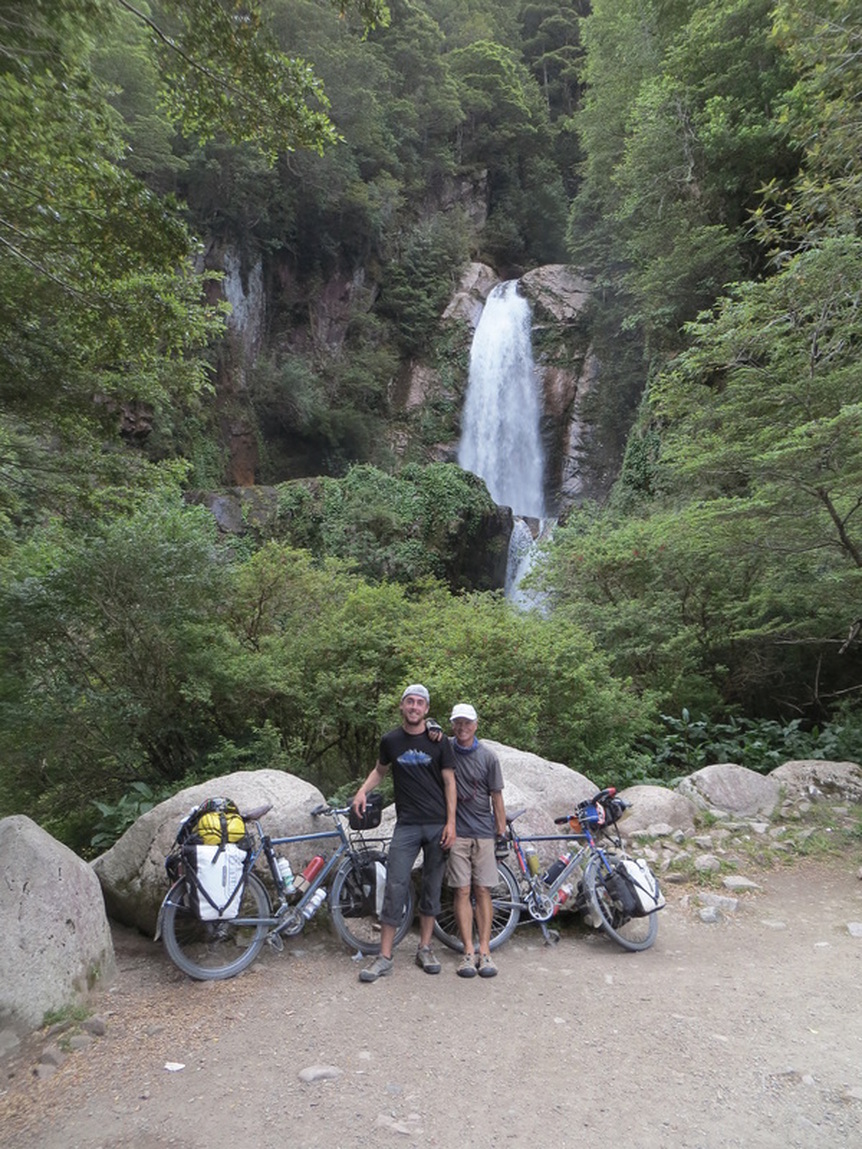 Simpson River National Park
Simpson River National Park
